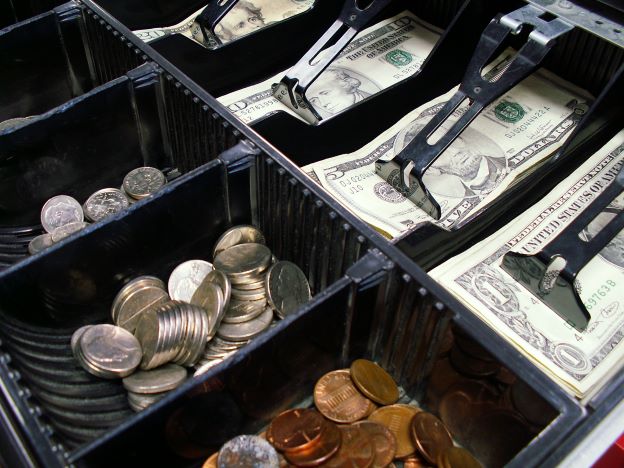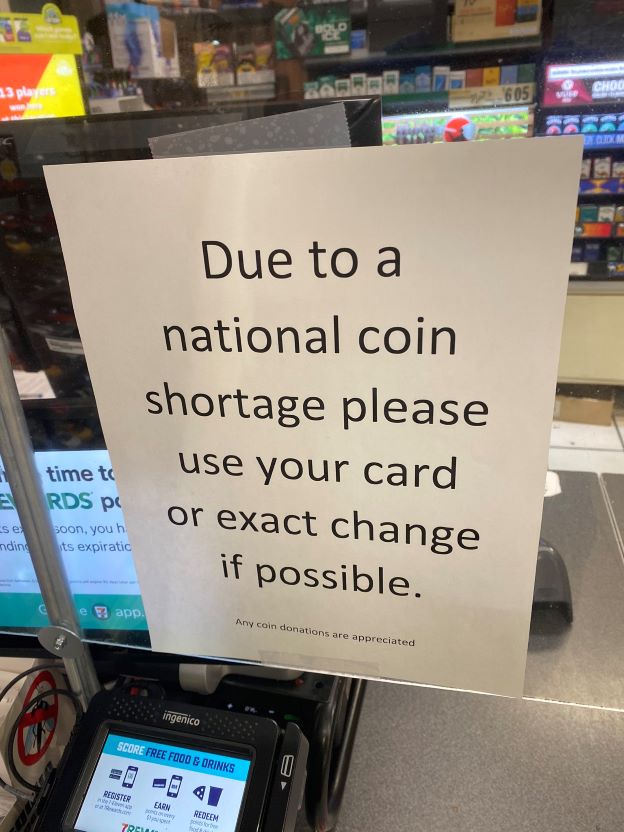
Call it a disruption or call it a shortage—not enough coins means pain for retailers and banks.
Treasurers of major retailers and restaurant chains sounded loud notes of alarm at a NeuGroup virtual meeting Friday about what many observers are calling a coin shortage. U.S. Bank, the meeting sponsor, described it as a “severe disruption” in the nation’s coin circulation sparked by COVID-19. (People have spent less cash during the pandemic and have exchanged far fewer coins for bills or credit at banks or grocery stores.)
Whatever you call this state of affairs, it’s a problem almost everyone said will turn painful this week and may last several months.
- “What is the sense of urgency?” of addressing the problem, one assistant treasurer asked a U.S. Bank representative who serves on the Federal Reserve’s cash advisory council.
- The U.S. Bank official said banks are keeping pressure on the US Mint, which ramped up production of all coins in mid-June, and are urging the Fed to make the public aware of the issue, including through social media.
- While there is no easy, short-term solution, U.S. Bank is exhausting all channels to help clients, given the Fed’s decision to effectively ration the amount of coins banks can access to supply businesses.
- The AT said his company’s coin orders are being filled at lower and lower percentages—as low as 20% or 0% in some areas. Roughly 20% of the company’s retail transactions are in cash.

Educating the public. “Why is the marketing campaign taking so long?” asked another member about expected efforts by the Fed to educate the public about the coin problem and encourage people to bring as many coins as possible back into the banking system.
- “We as retailers are going to have to deal with consumers who don’t understand,” she said.
- The treasurer of another retailer, where 40% of transactions are in cash, said there is some resistance from field teams to “having to explain the coin shortage in the country.”
Banks are showing a general lack of urgency/transparency. Members described their banks as providing varying degrees of help, from doing what they can, to “it’s not our problem” or “it’s not that bad of an issue.”
- Comparing the issue to toilet paper hoarding earlier in the crisis, members noted that there is CEO-to-CEO engagement between retailers and suppliers. But that level of engagement is not happening between retailers and their banks, who are their suppliers of coin.
Calls for more bank engagement. To address this, members suggested that banks come out with public letters from their CEOs calling attention to the coin shortage. This would help treasury get better traction and awareness in C-suites that this is a major issue that needs to be addressed.
Fixes are awkward, costly. Members noted that the fixes they are contemplating either are awkward or costly, and usually both.
- On the awkward side is training associates to always ask for exact change, posting signs encouraging this and even saying that customers who do not have exact change (or an electronic form of payment) may not be able to check out or have their order filled.
- On the cost side, moving low-dollar transactions to electronic payment has a significant economic cost (fees); rounding typically costs store as consumers don’t want to round up (and there are multi-jurisdiction tax issues to consider); and reprogramming point of sale systems can be expensive.
- Gift card issuance for change is also cumbersome. Some members are looking to donate change (or rounded-up amounts) to charity, usually the sponsored charity of the store.
- Meanwhile, operators are being told to stop depositing coins, bringing in their own coins from home, ask local banks for supply and not to turn away coin orders that are “short.”
Will coin disruption spread to notes? While banks have been assured by the Fed that the issue is not going to spread to notes, e.g., dollar bills or fives, retailers face an environment where the unexpected can happen, so members should extend their contingency plans to work out how to address disruption in smaller denomination notes as well.
Better/cheaper payment rails. Despite COVID-19 being a global issue, the coin disruption is principally a US problem, at least for the developed economies. Asked about the situation in the UK, for example, a member noted the country has an electronic payment system with much lower fees that allows for acceptance of electronic payment to become cost-effective at much lower ticket sizes. Multinational retailers are monitoring the situation in other cash-intensive markets closely, however.
Thus, the coin disruption provides yet another talking point alongside others with COVID-19, for those promoting an end to cash, a more inclusive electronic payment method, and digital currency. The Bank for International Settlements calls out the role of central banks with payments in this digital era, including establishing digital currencies in its recent economic annual report, for example.


